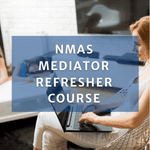NMAS Mediator Training
and Assessment Course
This 4o hour NMAS mediator course will teach you the basic skills needed to be a professional mediator according to the Australian National Mediator Accreditation System (NMAS).
The course fee includes all training and assessment needed for accreditation as a NMAS Mediator. The training is delivered online at your own pace. There are 9 mandatory role plays which you will participate in via video mediation. That means you will also develop your skills in video mediation.
The course includes access to individual and group mentoring sessions. You are also eligible for re-assessment if you do not pass your assessment the first time at no extra cost.
What is different about Mi's NMAS Mediation Training?
Are you considering becoming a professional mediator?
We would be delighted to assist you from the beginning when you do your NMAS Mediator Course and ongoing once you are qualified.
Mediation Institute are the mediation and communication skills specialists who train, assess, accredit and provide ongoing professional support for mediators.
Who is this course for?
The NMAS Mediator Course is for anyone who wants to become accredited as a mediator in Australia.
NMAS Mediation training provides the basic skills you need to become accredited under the National Mediator Accreditation System (NMAS).
Students come from a wide variety of backgrounds and include lawyers, psychologists, counsellors, community workers, human resources specialists, teachers, managers and many more backgrounds.
Want to review offline?
You can download a course information document that includes information about the NMAS Mediator Accreditation process by using the button below.
What are the step to becoming a NMAS Mediator?
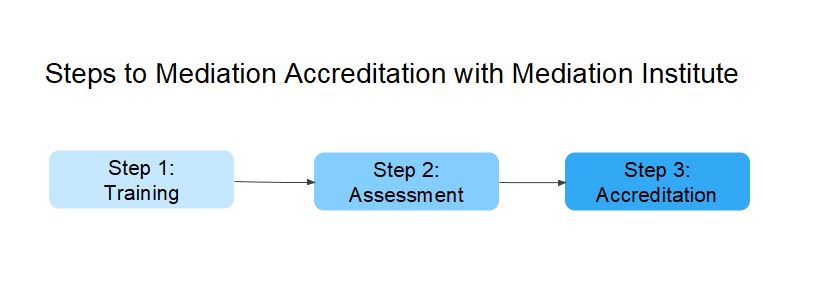
What is the Delivery Model?
Mediation Institute provides the NMAS Mediator Course training and assessment by eLearning.
That means that our students can undertake the course and be assessed for NMAS Accreditation from anywhere in Australia (or the world).
The course is self-paced allowing you to complete the course at your preferred pace.
Theory
Theory is learnt via an online learning platform which includes recorded and live webinars discussing different aspects of the skills and knowledge you require to be a mediator.
Skills Development
Skills development is facilitated by live mentored video mediation role plays with other students. You will be mentored by one of the qualified NMAS Accredited Mediators who make up our training team.
How Long is the NMAS Course?
The course takes about 40 hours to complete.
This includes eighteen hours of role plays. You will participation in a minimum of nine (9) live video mediation role plays.
Three (3) of those role plays must be with you undertaking the role of the mediator.
You must participate in a minimum of six (6) role plays as a role player and you can participate in as many role plays as a role player as you would like if you study with Mediation Institute.
Time to Complete
You have six months to complete the course although could complete it in as little as a week if you had the time to do it that intensively.
We have multiple role-play opportunities available each week however most students prefer a less intense approach and complete the course over 3 to 12 weeks.
We provide the opportunity to extend your training for up to 12 months if necessary.
Mediator Course Content
As a professional mediator it is important that you can see beyond the behaviour of the parties and understand the underlying dynamic of conflict.
There is a predictable course of escalation that can be observed and strategies to de-escalate.
With this knowledge and appropriate strategies we have a greater likelihood that we can assist our clients to de-escalate and negotiate peace in their relationship or resolve their issues.
There are five major styles that people adopt when faced with conflict. During the course you will have the opportunity to identify your preferred conflict style.
You will also learn strategies to help clients to move from conflict styles that do not encourage reaching a fair and equitable resolution towards the styles that support collaboration and compromise.
The NMAS Accreditation Course requires that the graduate is competent in facilitative mediation.
The course will teach you the process in an easy to remember three stage / 9 step process.
Mediators require a number of specialist communication skills. Some are used in other professions however there are some distinctions in how they are used. Advocates, such as lawyers, and those who work in an advisory or counselling role, have to adjust their style when working as a mediator. Key Skills are:
- Active Listening
- Acknowledging
- Reframes, Mirroring and the use of summaries
- Transition statements
- Empathetic and neutral facilitation
The course will clarify the legal and ethical obligations that mediators have.
This includes common law convention, duty of care, human rights and other obligations as well as the standards established in the National Mediator Accreditation System (NMAS)
Dealing with:
- power imbalances
- emotional responses
- cross-cultural factors
- high conflict personalities and more
Role Plays with a variety of scenarios:
- workplace
- neighbour
- elder mediation
- will dispute
- education dispute
FAQs
Firstly no. Our training isn’t bad. We believe it is a better methodology than an intensive face to face workshop. Our “failure rate” is less than 5% if you count failure as not passing your assessment role play the 1st time. We simply do not count that as failure.
With most other training providers if you fail your assessment you’ll have to pay hundreds of dollars for a re-assessment.
If you don’t pass your assessment the first time with Mediation Institute we offer you an intensive mentoring session and re-assessment once you understand why you were assessed as not-yet-competent and how overcome those issues.
No. The NMAS Mediator Course is a basic Mediation Skills Course. It is a pre-requisite course which will allow you to enrol in the CHC81115 – Graduate Diploma of Family Dispute Resolution.
Absolutely. If you would like a payment plan just let us know what would work for you.
We value flexibility so propose a payment plan that would work for you. You will have to finish paying for the course before your assessment and certificate of Assessment is issued.
If we don’t think that you are ready for your assessment or if you fail we will provide you with an intensive coaching session to help you to overcome the skills gaps you have.
We take responsibility for our training and understand that a set skills development schedule of 9 role plays (3 as a mediator) is not going to work for every learner. That is the requirement of training providers under the standard but there is nothing that prevents us from being more supportive when necessary.
We don’t know and don’t believe they can adequately train anyone (even if they are a lawyer) the legal and ethical obligations and skills required to facilitate property mediation in a 38 hour short course.
To be recognised as a Family Dispute Resolution Practitioner (family law mediator) under the Family Law Act 1975 you must complete the CHC81115 – Graduate Diploma of Family Dispute Resolution or equivalent higher education course.
NMAS is a possible pre-requisite to enrol in the Graduate Diploma level studies to become a Family Dispute Resolution Practitioner. You will have no status with the Attorney Generals Department (the regulator of Family Dispute Resolution Practitioner registration) with just NMAS Mediator Accreditation.
Mediation Institute offers this course via online learning (for the theory) and the skills development via video mediation. We do this for three reasons.
- To make the course flexible, accessible and without the associated costs to students to travel to a workshop.
- We want to equip our students to be mediators in the 21st Century where we believe that video mediation will become more and more popular and expected by clients and employers. The 2020 – 2021 pandemic proved the importance of being able to work remotely with our graduates fully equipped and able to deliver full service while other mediators struggled with upskilling, inadequate phone mediation or stopped working for the duration.
- We believe that intense workshops are not the best way to learn skills. They are done for convenience of the training provider rather than based on cognitive science or the way that humans learn skills. Repetition over time with intervals in between is the best way to build skills into our long term memories.
If you don’t want to learn how to facilitate Video Mediation it will be best that you find a training provider who does not share our vision for the future and only teaches via the traditional face to face workshop approach.
You can call the office to ask any other questions you have. We are happy to arrange for you to participate as an observer at a role play if you are nervous about online learning and participating in video mediation.
You could also talk with one of our gradates to find out about their experience. Our monthly updates list our graduates. Blog
Not usually. That often means that training flexibility is low. People don’t learn at the same pace, they have different amounts of learning (or unlearning) to do to become a competent mediator. Some come from diverse or disadvantaged backgrounds that can make learning slower.
Our goal is to provide sufficient support that anyone who applies themselves can meet the standard the need to meet and pass the requirements. We’ll provide the support but you do have to learn and apply the skills.
Train with Mediation Institute
Become a NMAS Mediator
Conveniently train online with individual mentoring available and reassessment available (if needed) at no extra cost.
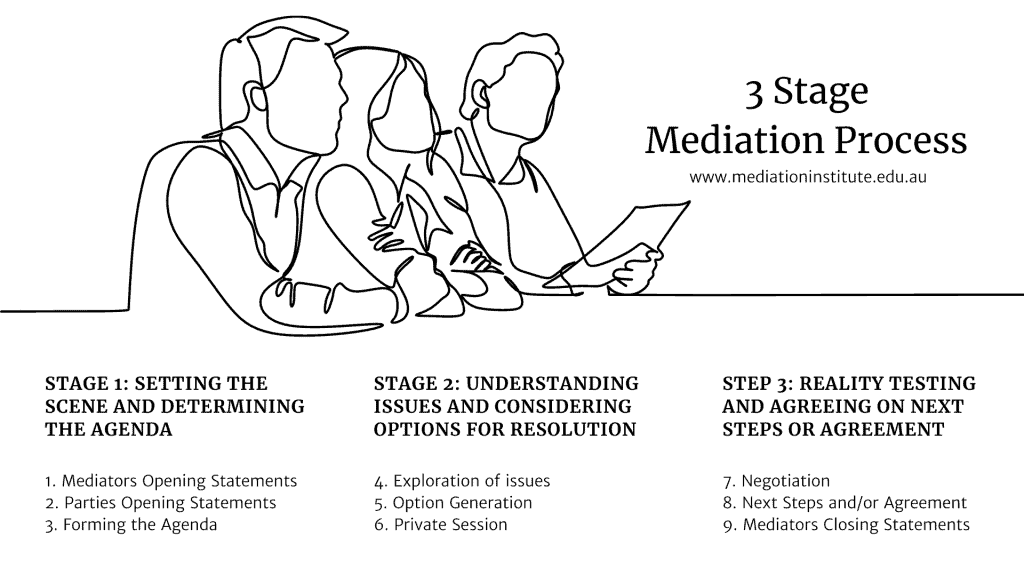
Meet Our Supportive Training Team
Our NMAS Course Mentors and Assessors

Joanne Law

Cynthia Brooking

Ken Speakman

Lee Lee

Brian Williams

Darren Clark

Peter Johnston
Train with Mediation Institute
Become a Mediator
Conveniently train online with reassessment available at no extra cost.
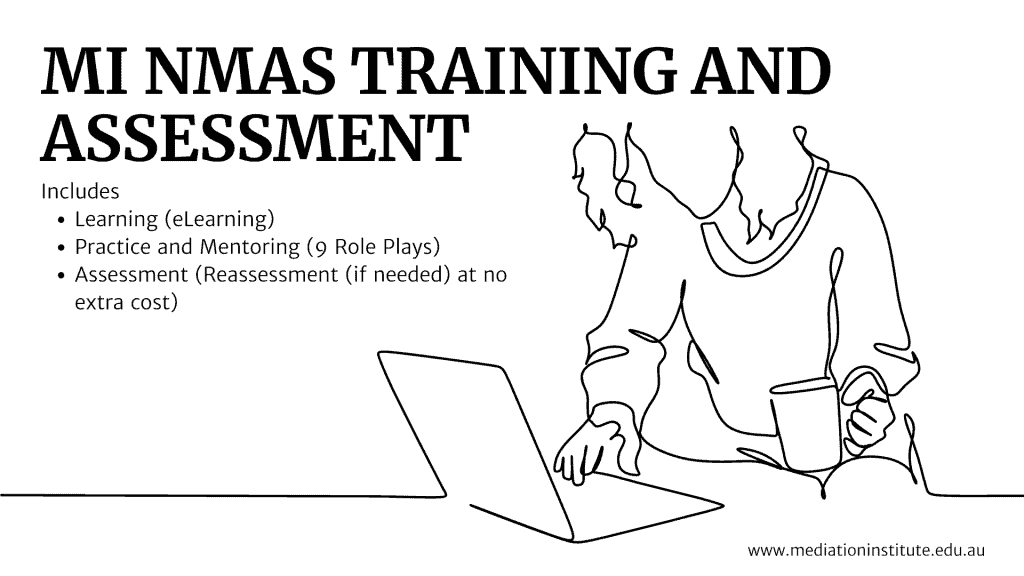
Student Endorsements
NMAS Mediator
Training and Assessment - Continuous enrolment no need to wait-
Includes your assessment
-
Up to 6 months to complete the 40 hours of learning required
-
Online learning through a Learning Management System (LMS)
-
Role plays organised by Mi with other students and fully online
-
Your assessment role play via online with Mi assessors
I highly recommend this mediation course given the high standard of expertise provided by the team and mentors, the flexible online learning structure and process, along with a welcoming and supportive learning environment is a winning combination. MI have developed an accredited course that delivered well above my expectations. In completing NMAS accreditation, MI facilitate ongoing learning and practice pathways to genuinely assist graduates into the area of mediation that appeals to them. Joanne Law provides clear and accessible information and support with all inquiries, applications and MI related support networks, as did Cynthia Brooking and Ken Speakman deliver high quality mentoring skills and knowledge to strengthen aid in my passing the accreditation assessment. The NMAS course structure and process is a fail-safe course that sets graduates up for success. Be sure to inquire with MI about their NMAS course. I am thrilled with my learning outcomes and future employment options.

Cynthia in particular who went out of her way to believe in me and provide continual extensive support and encouragement, as did Ken who never hesitated to repeatedly allow me into his support sessions and for providing additional resources and encouragement. I can't speak highly enough of all the mentors for their collective knowledge, extensive individual professional experience, insights, strategies, hints and tips, and endless patience.
Thank you to all the MI team for allowing me to listen to as many roleplays and assessments that I could attend with no cap for observing, as this enabled me to recognise the stages of mediation (I found this confusing at first) and identify what works well, what worked better and what may not be so effective as every roleplay presented differently (as it will in the real world). It certainly was a journey with not only the usual interruptions but a major self confidence barrier from an external source which I had to overcome. The MI team was outstanding and relentless in providing exceptional, genuine support and belief in my ability, which has now enabled me to become an NMAS accredited Mediator! I'm now researching further study with MI!🙌





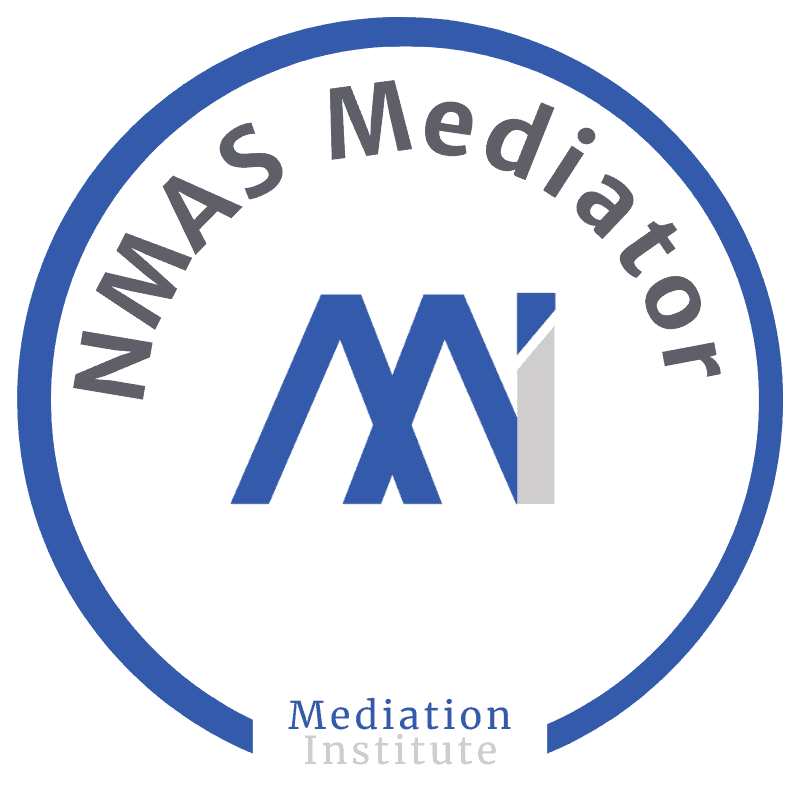
Frequently Asked Questions
What is the difference between NMAS and AMDRAS?
- NMAS (National Mediator Accreditation System) has been the standard for accrediting mediators in Australia since 2007 with some minor tweaks in 2015.
- AMDRAS (Australian Mediator and Dispute Resolution Accreditation Standards) is the new system that will replace NMAS in a 12 month transition that started from the 1st July 2024, with the transition ending on the 30th June, 2025.
- The transition ending will mean that new training has to be under AMDRAS but for anyone who is currently training, being assessed or within the window of time to apply for accreditation the NMAS will still apply.
The transition to AMDRAS has started. Why can I still enrol in NMAS Training?
Yes. The transition started on the 1st July 2024 and ends on the 30th June 2025. At time of writing (Late November 2024) the AMDRAS board has not yet approved any Recognised Training Providers or courses under AMDRAS so all Mediator Training in Australia is NMAS training still.
When Recognised Training Providers are approved to provide training under AMDRAS we will be able to start enrolling for basic and more advanced mediator training under AMDRAS. We hope that will be very soon.
We have designed our new AMDRAS course and submitted an application for approval.
The transition rules allow you to enrol in an NMAS course right up until the 30th June 2025 and have the full time allowed under the standards, subject to the specific policies of the training provider.
We will end enrolment into this course once we are able to start training under AMDRAS and teach out any remaining students.
Which is better? NMAS or AMDRAS training?
Define better?
Longer – the AMDRAS course is longer according the the requirements set by the new standards.
Less expensive – the NMAS course is cheaper. The longer format of the AMDRAS course has resulted in a fee increase.
More structured – as part of the review of our course to prepare for AMDRAS we’ve identified that a more structured approach may improve student commitment and increase the speed to complete. The AMDRAS course will be a lot more structured and the NMAS course is significantly more flexible.
Delivery mode – unchanged. We are committed to the accessibility advantages of online learning combined with live, video mediation role plays and tutorials.
Time to complete – normally people can complete the NMAS training in 4 to 6 weeks. The AMDRAS course is 6 weeks long. If you can’t keep up the pace of the course you will be able to transfer to a following course group.
Link to the Mi Mediator Network
Join the Mi Mediator Network
We host this free network as a support to Mediators. The Mi Mediator Network is for dispute resolution professionals who want to …
Network | Share Learning | Collaborate

